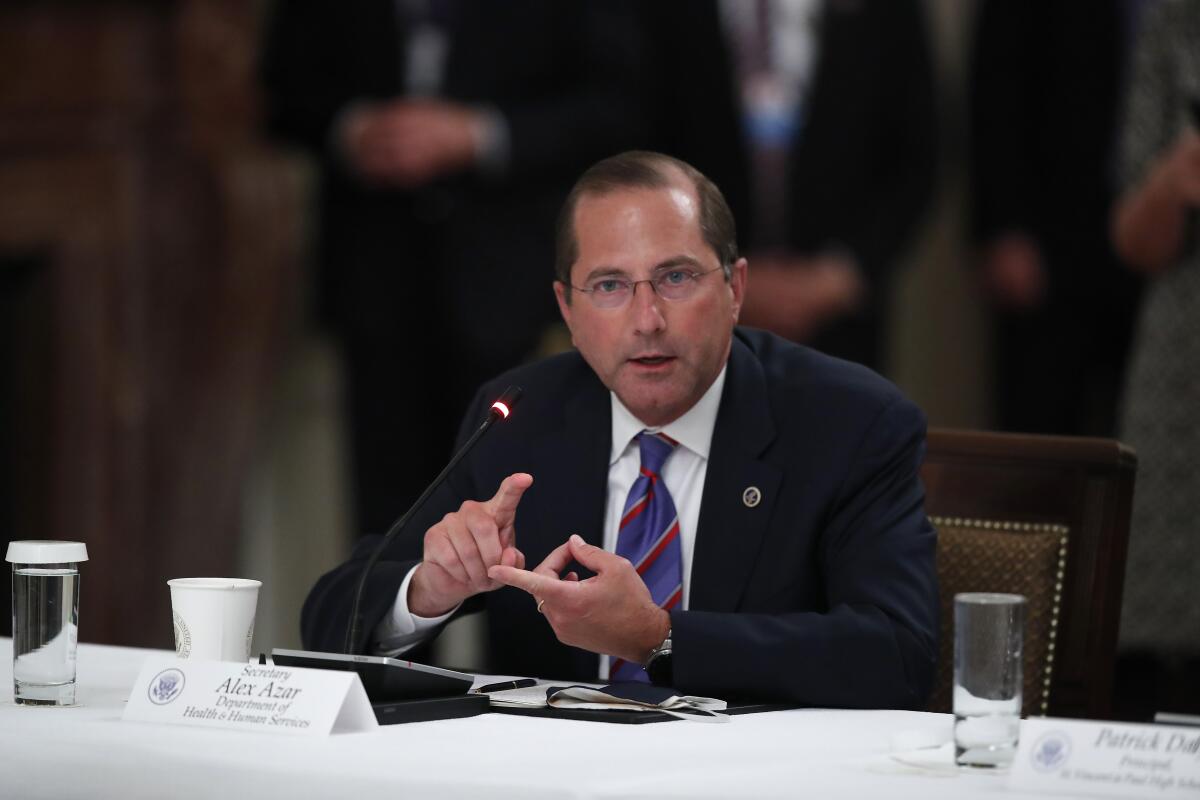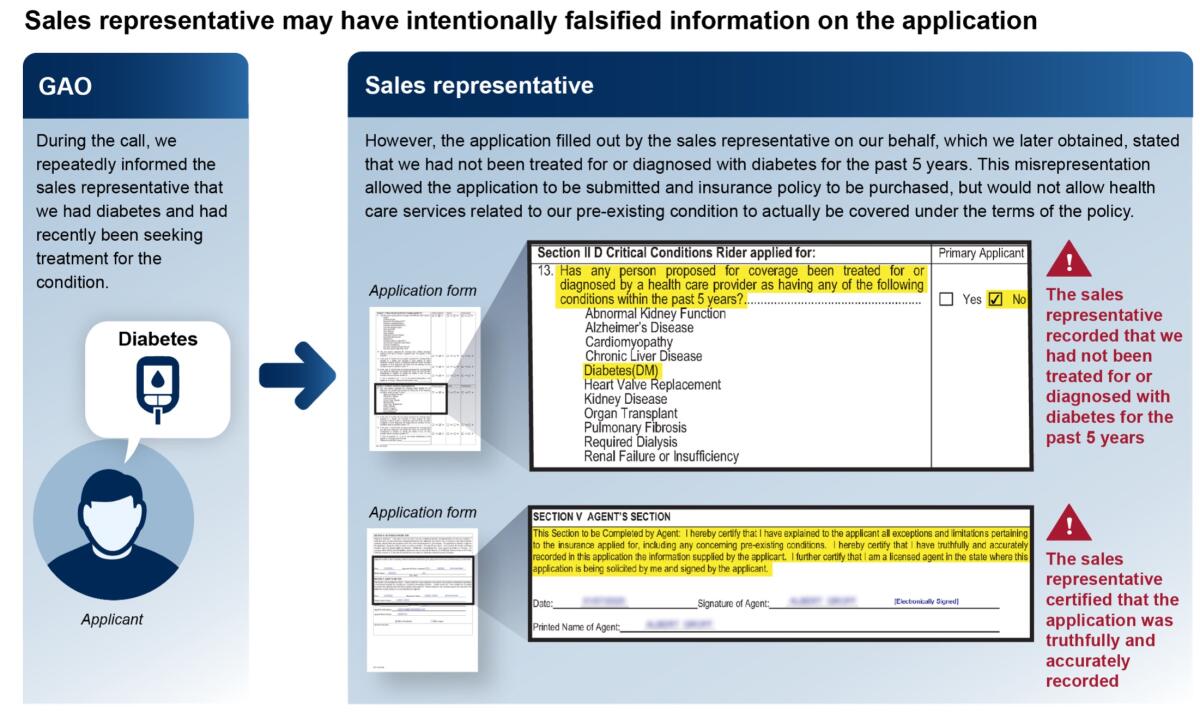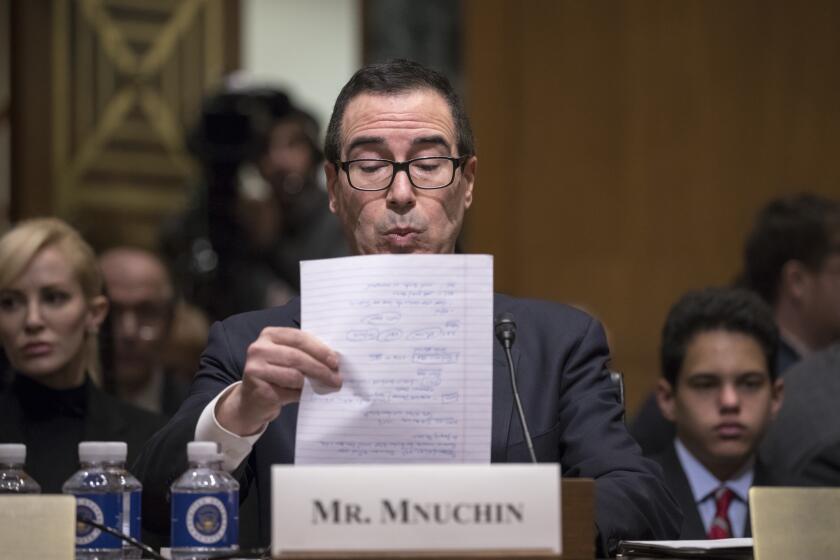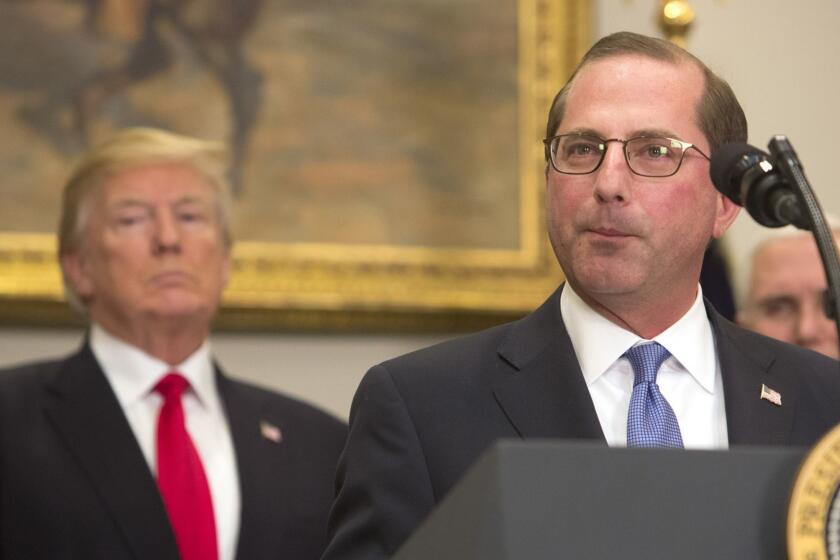Column: GAO finds the selling of junk health plans favored by Trump is rife with deception

One of the great features of the Affordable Care Act is that it clearly sets forth its consumer protection features, making it harder for unscrupulous health plan marketers to cheat the public.
It has been well understood that the Trump administration’s energetic promotion of ACA-exempt health plans has the capacity to undermine this crucial safeguard.
Now the Government Accountability Office has put meat on the bones of that expectation, with a report detailing how its undercover staff were repeatedly misled by health plan sales representatives in sales calls.
Potentially deceptive sales practices...could lead a consumer to make poor decisions with the potential to incur significant and unexpected costs.
— Government Accountability Office
Among other deceptions, sales reps repeatedly told the GAO agents that their plans would cover their preexisting diabetes. The plans, in fact, excluded coverage, limited its value, or required lengthy waiting periods before the coverage would kick in.
Trump has consistently claimed that he has a plan coming out that will guarantee coverage of people’s preexisting medical conditions.
Based on the fact that he has never released any such plan despite promises that it’s imminent, and based on his support of a red-state lawsuit that would extinguish the ACA in its entirely, that claim is a flagrant lie.

The GAO’s experience with sales representatives of exactly the kinds of health plans Trump and his minions, such as Health and Human Services Secretary Alex Azar, are pushing on the American public exposes the deception at the heart of Trump’s promise.
We’ve reported before on the administration’s drive to weaken the standards imposed by the ACA by promoting noncompliant health plans, through executive orders and proposed regulatory changes.
For example, the White House has pushed to liberalize the rules governing short-term health plans, which are traditionally designed as a bridge between full-service health insurance and are meant to last a few months at most; Trump has moved to extend their terms to as long as a year and allow them to be renewed.
Healthcare sharing ministries siphon enrollment from legitimate health insurance plans, thus weakening the latter and likely driving up their costs.
Trump also has proposed liberalizing the rules governing faith-based health plans. These “sharing plans” are arrangements that don’t guarantee that enrollees’ claims will be paid at all.
The Trump pitch is that these plans carry lower premiums or payments, so they’re more affordable for lower-income households.
What the administration doesn’t make very clear is that the plans are not required to offer all the essential health benefits required of ACA-compliant plans, including hospitalization, maternity care, prescriptions and mental health services.
If your needs fall into any of those categories, you may find yourself on your own. In other words, the supposed savings may be entirely illusory.
Because these details are murky, consumers seeking such plans can be easily misled. That’s what the GAO documented.
The GAO’s investigation was prompted by a request from Democratic Sens. Bob Casey of Pennsylvania and Debbie Stabenow of Michigan. The agency’s undercover staff contacted 31 marketers of ACA-exempt plans while posing as potential customers with low incomes and preexisting diagnoses of diabetes.
Of the 31 targets, 21 properly steered the callers to ACA-compliant plans that would cover their diabetes. Some also explained that the callers’ income would make them eligible for government subsidies that would bring their insurance costs down.
Of the 10 others, however, two provided inconsistent or confusing information about what the GAO agents were buying. The other eight sales calls were even more troubling.
In all eight cases, the sales representatives told the callers that their diabetes would be covered, even though plan documents the GAO later received made clear that diabetes would be excluded as a preexisting condition, wouldn’t be covered for 12 months, or that the plan limited the number of covered doctor visits.
The Trump administration’s most insidious attack on the Affordable Care Act involves its loosening of the rules covering short-term health plans.
In one case, the sales rep filled out the coverage application for the caller, falsely stating on the application that the caller had not been treated for or diagnosed with diabetes for the past five years. This salesperson also falsely told the caller that the plan’s limitations on coverage of preexisting conditions applied only to pregnancy or cancer cases.
That salesperson also falsely told the caller that the ACA was no longer in effect as of this year.
Some sales representatives refused to provide the callers with plan documents until they signed up.
The agency cautions that its investigative results “cannot be generalized to all sales representatives, any particular state, or the PPACA-exempt industry at large,” using the ACA’s formal designation as the Patient Protection and Affordable Care Act. It refers to the sales pitches neutrally as “potentially deceptive marketing practices.”
But the GAO also makes the consequences of this behavior plain: “Potentially deceptive sales practices ... could lead a consumer to make poor decisions with the potential to incur significant and unexpected costs if plans purchased do not meet their health coverage needs.”
No kidding? The Trump administration’s strategy from the moment it took office is to undermine the Affordable Care Act by promoting alternative coverage that barely ranks as coverage at all. The GAO’s report shows what consumers face when they step into this tank of sharks.









